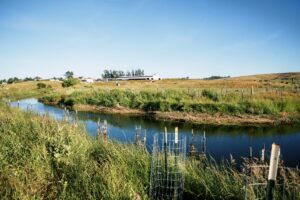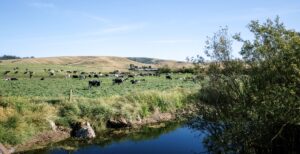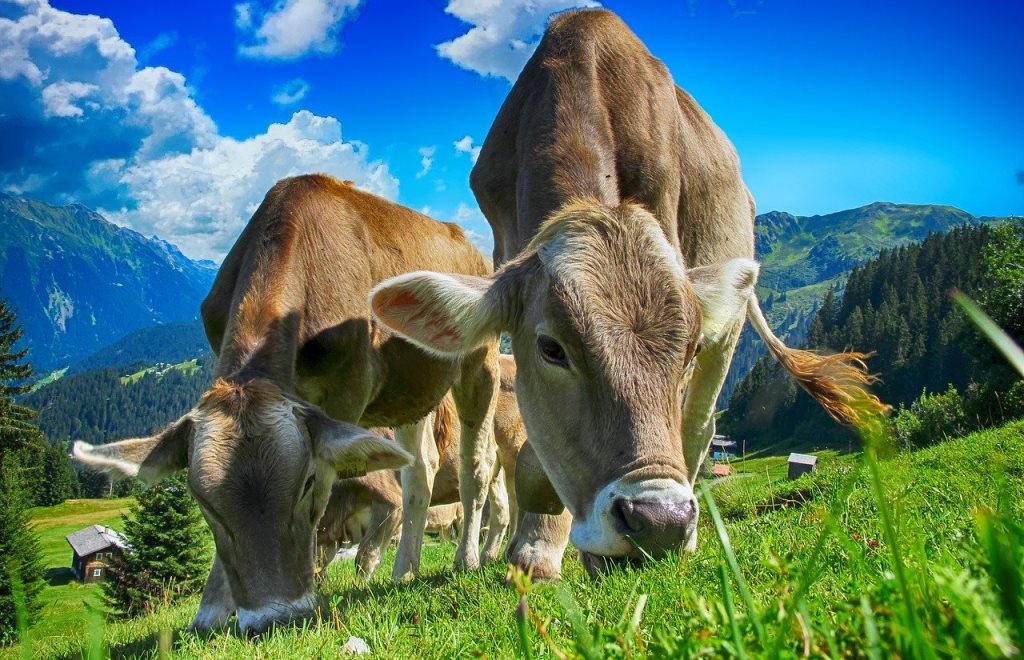On June 23, 2020, Organic Valley, America’s largest farmer-owned organic cooperative, announced the implementation of two riparian restoration projects on two of its Sonoma County, California farms.
Roughly 2 acres each, the projects will provide ecological restoration of riparian areas (i.e., streambanks and spring areas) on their respective properties. They will also help restore our global climate by sequestering some 40 metric tons of carbon within their first five years.
As defined back in 2002 in The Restoration Economy, regenerative agriculture isn’t just about no-till and soil rebuilding: it also encompasses ecological restoration, especially that which helps restore native pollinators.
 The first restoration started in December 2018 on the McClelland dairy farm in Petaluma, on 2 acres of designated land near Stemple Creek. Over 150 students and teachers (approximately five classes) of the Students and Teachers Restoring a Watershed (STRAW) program planted 90 individual plants consisting of 12 species of native trees and shrubs, including Coast live oak, Oregon ash, California blackberry and coffeeberry.
The first restoration started in December 2018 on the McClelland dairy farm in Petaluma, on 2 acres of designated land near Stemple Creek. Over 150 students and teachers (approximately five classes) of the Students and Teachers Restoring a Watershed (STRAW) program planted 90 individual plants consisting of 12 species of native trees and shrubs, including Coast live oak, Oregon ash, California blackberry and coffeeberry.
The second phase will begin in summer 2020, when STRAW will install irrigation systems on both farms. After the school year, STRAW staff will monitor and maintain the projects for one to two years. This project will help prevent erosion, maintain water quality, provide habitat for wildlife, and preserve the health of the entire ecosystem.
STRAW is a hands-on student project related to watershed restoration that is integrated into overall classroom work. Its goal is to influence the overall culture of the schools STRAW works with.
The second restoration started earlier this year on the Bordessa farm, Ocean Breeze Dairy, in Valley Ford. At the beginning of 2020, an estimated 14 classrooms consisting of 14 teachers, 350 students, and 60 volunteers participated in the Ebabias Creek restoration project. The volunteers planted almost 700 native species during the first phase of the project. The second phase will begin in early spring, when STRAW will install an irrigation system.
 “It’s important to take care of the land, water, and air we breathe. Every little bit that we can all do contributes to having a healthier earth,” said Jana McClelland, McClelland Dairy owner.
“It’s important to take care of the land, water, and air we breathe. Every little bit that we can all do contributes to having a healthier earth,” said Jana McClelland, McClelland Dairy owner.
The Ebabias Creek Riparian Restoration Project is part of California Climate Investments, a statewide program run by the Coastal Conservancy. It puts billions of cap-and-trade dollars to work reducing greenhouse gas emissions, strengthening the economy, and improving public health and the environment, particularly in disadvantaged communities.
The Coastal Conservancy is a California state agency established in 1976 to protect and improve natural lands and waterways, to help people get to and enjoy the outdoors, and to sustain local economies along California’s coast. Its official vision is of a beautiful, restored, and accessible coast for current and future generations of Californians.
“I wanted to implement the practices that the Organic Valley sustainability team was talking about and see what would happen on my farm,” added Jarrid Bordessa, Ocean Breeze Dairy owner.
Such projects that restore land and sequester carbon from the atmosphere are called “carbon farming” projects “You plant the ‘seed’ somewhere and it will grow – we have additional farmers signed up for Climate Smart Farm Planning plans in Sonoma County just because these two farmers did it,” said Jessica Luhning, sustainability manager at Organic Valley. “Across the U.S., interest in carbon farm planning in our cooperative continues to grow.”
Organic Valley is America’s largest cooperative of organic farmers and one of the nation’s leading organic brands. Organized in 1988, it represents more than 1,800 farmers in 34 U.S. states, Canada, Australia and the United Kingdom and achieved $1.1 billion in 2019 sales. Focused on its founding mission of saving family farms through organic farming, Organic Valley produces a wide range of organic dairy, egg and produce products. With its regional model, milk is produced, bottled and distributed right in the region where it is farmed to ensure fewer miles from farm to table and to support local economies.
Photo by Pete Linforth from Pixabay.

